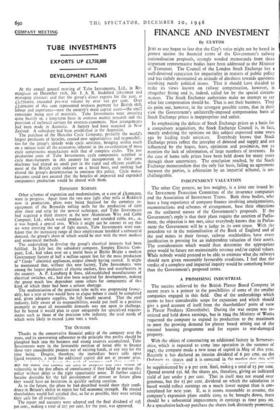FINANCE AND INVESTMENT
By CUSTOS
JUST as one began to fear that the City's voice might not be heard in protest against the financial terms of the Government's railway nationalisation proposals, strongly worded memoranda from three important representative bodies have been addressed to the Minister of Transport. The Council of the London Stock Exchange has a well-deserved reputation for impartiality in matters of public policy and has rightly maintained an attitude of aloofness towards questions involving purely political issues. That it should have decided to make its views known on railway compensation, however, is altogether fitting and is, indeed, called for by the special circum- stances. The Stock Exchange authorities make no attempt to say what fair compensation should be. That is not their business. They do point out, however, in the strongest possible terms, that in their view the Government's unilaterally-imposed compensation basis of Stock Exchange prices is inappropriate and unfair.
In emphasising the defects of Stock Exchange prices as a basis for a compulsory acquisition, the Stock Exchange Council is, in fact, merely endorsing the opinions on this subject expressed some years
ago by leading trade unionists. Everybody knows that Stock Exchange prices reflect the interplay of demand and supply, nd are influenced by the hopes, fears, optimism and pessimism, -not to mention the lack of information, of large numbers of investors. In the case of home rails prices have been held down for many years through sheer uncertainty. The conclusion reached, by the Stock Exchange memorandum that the only fair basis, failing an agreement between the parties, is arbitration by an impartial tribunal, is un- ch alleng eable.
INDEPENDENT VALUATION
The other City protest, no less weighty, is a joint one issued by the Investment Protection Committee of the insurance companies and the Association of Investment Trusts. Both these bodies, who have a long experience of company finance involving amalgamations, reconstructions and schemes of arrangement, base their objections on the unilateral nature of the Government's proposals. If the Government's reply is that their plans require the sanction of Parlia- ment, the objection is not met, since everybody knows that in Parlia- ment the Government will be a judge in its own cause. With the precedent set in the nationalisation of the Bank of England and of the coal mines in their favour, railway stockholders have every justification in pressing for an independent valuation of their assets. The considerations which would then determine the appropriate price would be future net maintainable revenue and/or capital values. While nobody would pretend to be able to estimate what the railways should earn given reasonably favourable conditions, I feel that the verdict of a complete and impartial inquiry would be something better than the Government's proposed terms.
A PROMISING INDUSTRIAL
The success achieved by the British Plaster Board Company in recent years is a pointer to the possibilities of some of the smaller companies engaged in this field. One of the undertakings which seems to have considerable scope for expansion and which should give a good account of itself from the shareholders' point of view is Plaster Products (Greenhithe). During the war output was re- stricted and held down earnings, but in 1944 the Ministry of Works requested the company to expand its production to the maximum to meet the growing demand for plaster board arising out of the national housing programme and for repairs to war-damaged property.
With the object of constructing an additional factory in Somerset- shire, which is expected to come into operation in the summer of 1947, the company made a new issue of capital in May of this year. Recently it has declared an interim dividend of 6 per cent. on the Ordinary CC shares and it is expected in the market that thic laral be supplemented by a 9 per cent. final, making a total of 55 per cent. Quoted around 15s. 6d. the shares are, therefore, giving an indicated yield of just under 5 per cent. That in itself may not sound over generous, but the 15 per cent. dividend on which the calculation is based would reflect earnings on a much lower output than is con- templated for next year. If, as it seems reasonable to assume, the company's expansion plans enable costs to be brought down, there should be a substantial improvement in earnings as time goes on. As a speculative lock-up purchase the shares look distinctly promising.


































 Previous page
Previous page